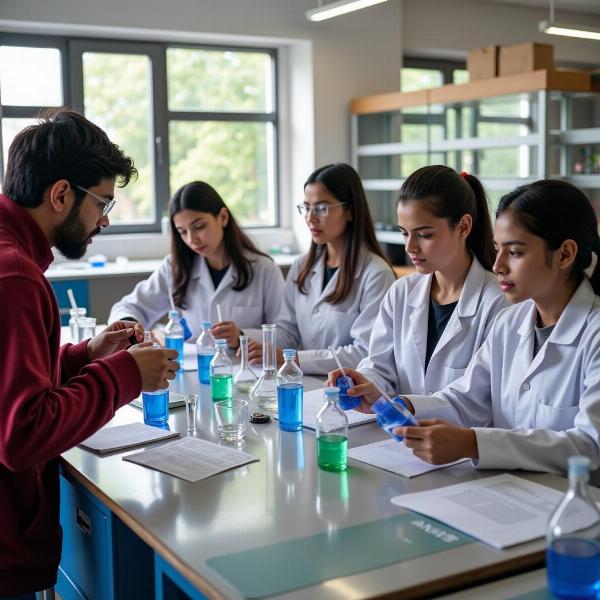Chemistry, a fundamental branch of science, explores the composition, structure, properties, and transformations of matter. But what is the meaning of chemistry in Hindi? Understanding this core concept in Hindi opens doors to a deeper appreciation of the scientific world around us. The Hindi word for chemistry is “रसायन विज्ञान” (rasayan vigyan). This term beautifully encapsulates the essence of the subject: “रसायन” (rasayan) refers to chemicals or substances, and “विज्ञान” (vigyan) means science. Therefore, “रसायन विज्ञान” literally translates to “the science of chemicals.”
Understanding “Rasayan Vigyan” (रसायन विज्ञान)
The term “रसायन विज्ञान” (rasayan vigyan) isn’t just a literal translation; it reflects a rich history of scientific inquiry in India. Ancient Indian texts, like the “Charaka Samhita” and “Sushruta Samhita,” delve into the properties of various substances and their medicinal applications. This deep-rooted understanding of the natural world laid the foundation for the modern study of chemistry in India. Think of the vibrant colours used in traditional Indian textiles, the intricate processes of Ayurveda, or the art of metallurgy – all showcasing the practical applications of chemical principles long before the formalization of “chemistry” as a scientific discipline.
The Scope of Chemistry in India
Chemistry plays a vital role in various sectors in India, from agriculture and medicine to industrial development and environmental protection. Understanding “रसायन विज्ञान” is crucial for students pursuing careers in these fields. The Indian chemical industry is a significant contributor to the nation’s economy, producing a wide range of products, from fertilizers and pharmaceuticals to plastics and polymers.
Chemical Education in India
Chemical education in India has a strong emphasis on both theoretical knowledge and practical applications. Students are encouraged to explore the fundamental principles of chemistry and their relevance to real-world challenges. This approach fosters innovation and prepares students for diverse career paths in research, industry, and academia. Imagine a young student learning about the chemical composition of fertilizers and its impact on crop yields – this understanding can lead to innovative solutions for sustainable agriculture.
 Chemistry Education in India
Chemistry Education in India
Different Branches of Chemistry
“रसायन विज्ञान” encompasses several specialized branches, each focusing on a specific aspect of the science. These include organic chemistry, inorganic chemistry, physical chemistry, analytical chemistry, and biochemistry, among others. Each branch offers unique insights into the fascinating world of matter and its transformations. For example, organic chemistry, the study of carbon-containing compounds, is essential for understanding the complex molecules that make up living organisms.
Organic Chemistry (कार्बनिक रसायन विज्ञान): The Chemistry of Life
Organic chemistry, or “कार्बनिक रसायन विज्ञान” (kaarbनिक rasayan vigyan) in Hindi, is the study of carbon compounds. These compounds form the basis of life, and understanding their structure, properties, and reactions is crucial in fields like medicine, pharmaceuticals, and materials science.
Inorganic Chemistry (अकार्बनिक रसायन विज्ञान): The Chemistry of Non-Living Matter
Inorganic chemistry, known as “अकार्बनिक रसायन विज्ञान” (akaarbनिक rasayan vigyan), deals with the properties and behavior of inorganic compounds, which do not contain carbon-hydrogen bonds. This branch is important for understanding the properties of minerals, metals, and other non-living materials.
Why is Learning Chemistry Important?
Learning chemistry is not just about memorizing formulas and equations. It’s about developing critical thinking skills, problem-solving abilities, and a deeper understanding of the world around us. From the food we eat to the medicines we take, chemistry plays a central role in our lives.
Conclusion
“What is the meaning of chemistry in Hindi?” The answer is “रसायन विज्ञान” (rasayan vigyan) – a term that encompasses a rich scientific tradition and a vast field of study with profound implications for our world. Understanding the meaning and scope of chemistry in Hindi is crucial for anyone seeking to engage with this fascinating and impactful science. Whether you’re a student, a researcher, or simply curious about the world around you, exploring the wonders of “रसायन विज्ञान” can open up a world of knowledge and opportunity.
FAQ
- What is the Hindi word for organic chemistry? कार्बनिक रसायन विज्ञान (kaarbनिक rasayan vigyan)
- What are some real-world applications of chemistry in India? Chemistry plays a vital role in agriculture, medicine, industrial development, and environmental protection in India.
- Why is understanding “रसायन विज्ञान” important? It provides a deeper understanding of the scientific world and opens doors to various career opportunities.
- What does “विज्ञान” mean? “विज्ञान” (vigyan) means science.
- What does “रसायन” mean? “रसायन” (rasayan) refers to chemicals or substances.
- Is chemistry important for the Indian economy? Yes, the Indian chemical industry is a significant contributor to the nation’s economy.
- What are the main branches of chemistry? Organic chemistry, inorganic chemistry, physical chemistry, analytical chemistry, and biochemistry are some of the main branches.
asid meaning in hindi
jacuzzi meaning in hindi
divalent meaning in hindi
Meaning-Hindi.in is your premier resource for professional Hindi translation services. We specialize in a wide range of translation needs, from business and legal documents to technical manuals and educational materials. Our expert team ensures accurate, culturally sensitive translations for businesses, individuals, and academic institutions. Contact us today for your Hindi translation needs! Email: [email protected], Phone: +91 11-4502-7584. Let Meaning-Hindi.in bridge the language gap for you.